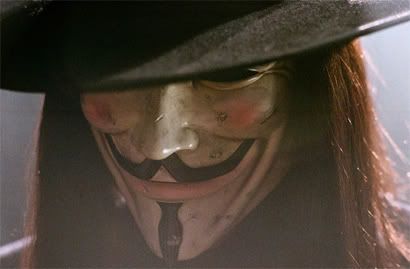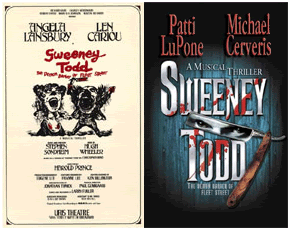
Many in the theatre community are up in arms over the proposed film adaptation of Stephen Sondheim’s Sweeney Todd. Among the complaints: 1) it shouldn’t be a movie; 2) Tim Burton is an inappropriate direction choice; and 3) Johnny Depp would make a bad Sweeney. But I ask you to cast aside your worries for the time-being and listen to what I have to say.
Complaint Number One: Sweeney Todd is a stage musical and shouldn’t be made into a movie. Of the three complaints listed, this one holds the most water. Ever since the horrible film adaptations of some of my favorite books, I’ve been very wary of the adaptation phenomenon. But in most cases, the authors of my favorite books are dead and, therefore, have no say in the adaptation process. In the case of Sweeney Todd, Mr. Sondheim is still alive and composing and even consulted the cast and crew of the new Broadway revival of the very show we’re speaking of. Since Mr. Sondheim is still with us, he may very well also help out with this production of (what I consider) his masterpiece.
Another hurdle in the adaptation process is the fact that Sweeney is a very theatrical piece, with over-the-top numbers and nearly-operatic climaxes unfit for the confining silver screen. As much as I would hate to see some of Sondheim’s best music get the axe, an easy way to make numbers like “Epiphany” work on film would be to turn them into underscored dialogue, which I will touch on in more detail later.
The last hurdle in the adaptation process is the director, which is where Complaint Number Two comes in: Tim Burton’s direction style is not right for Sweeney Todd; his films are too cartoonish. Tim Burton strikes me as a very intelligent director with a distinct vision for every movie he makes and that is precisely why this partnership will work. Sondheim’s Sweeney Todd’s is so remarkably written in every sense, that as long as the substance remains the same, a director can do nearly anything he wants with theme or style, especially if he is such a distinct visionary like Mr. Burton. Just look at the two Broadway productions we’ve seen. Under Hal Prince’s direction, Sweeney was a tale of social injustice told in a modern sort of expressionistic style while John Doyle’s recent production takes a closer look at the story’s psychological underpinnings. Prince’s stage was large with a metallic and industrial looking set while Doyle works with a small stage  and a minimalist set with very few props. Even the orchestrations and casts are very different. Prince had a 27-piece orchestra while Doyle cut it down to nine. Prince worked with a large chorus in addition to the main characters while Doyle’s cast of ten serves as both the established characters and the chorus. Even the characters are portrayed differently in Doyle’s production: a more introverted Sweeney, a sexier Mrs. Lovett, and woman as Pirelli. And yet, with all these differences, the story still shines through and the story is what’s most important. Don’t write off Mr. Burton quite yet.
and a minimalist set with very few props. Even the orchestrations and casts are very different. Prince had a 27-piece orchestra while Doyle cut it down to nine. Prince worked with a large chorus in addition to the main characters while Doyle’s cast of ten serves as both the established characters and the chorus. Even the characters are portrayed differently in Doyle’s production: a more introverted Sweeney, a sexier Mrs. Lovett, and woman as Pirelli. And yet, with all these differences, the story still shines through and the story is what’s most important. Don’t write off Mr. Burton quite yet.
All that remains in dispute is Complaint Number Three: Johnny Depp would make a horrible Sweeney. My first response to this would be, “ARE YOU INSANE?! HAVE YOU NEVER SEEN THE GUY ACT BEFORE?!” But that, of course, is not the most intelligent of arguments, so I suppose I’ll have to support it with some actual logic. First, Tim Burton is directing this film and, for whatever reason, he and Depp have an uncanny understanding of each other, such that their movies tend to turn out better-than-well. It is very true that we don’t know whether or not Depp can sing any Sondheim score, let a alone the tremendous difficulty of Sweeney Todd’s score, but think of it this way: If Burton decides (as rumored) to convert some of the more theatrical songs to underscored dialogue, Johnny Depp is the best possible choice for the role of Sweeney Todd. If you think Michael Cerveris makes an introverted and contemplative Sweeney, just wait until you see Johnny Depp. I can just picture him stepping outside his barber shop on Fleet Street, whispering maliciously to himself as he surveys the crowd below, “All right . . . you sir! How about a shave? Come and visit your good friend Sweeney. Ah! You too, sir! Welcome to the grave.” It could work marvelously.
I’m not saying this will be a perfect adaptation, or even a suitable one at that, but there’s no way of knowing until it’s made. All I’m saying is that we have plenty of information that hopefully points to a good adaptation. Just give it a chance.
 had to be real as opposed to a box on the checklist of scriptwriting.
had to be real as opposed to a box on the checklist of scriptwriting.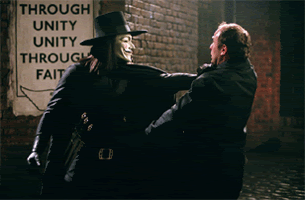 Evey is swept up in V’s world of vigilantist vengeance, which she is initially reluctant to take part in.
Evey is swept up in V’s world of vigilantist vengeance, which she is initially reluctant to take part in.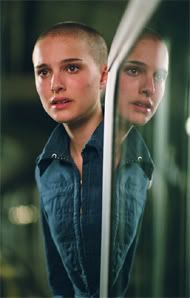 It is both a testament to Portman’s skill and the excellence of the writing that this transformation doesn’t seem unnatural.
It is both a testament to Portman’s skill and the excellence of the writing that this transformation doesn’t seem unnatural.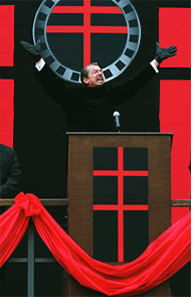 world of the government.
world of the government.